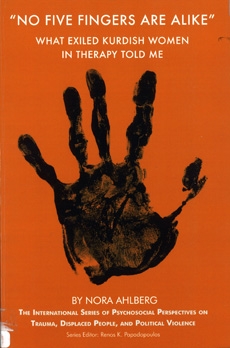
"No Five Fingers Are Alike"
Nora Ahlberg
Karnac
'This remarkable book is the second in the International Series of Psychosocial Perspectives on Trauma, Displaced People and Political Violence and it continues to offer what the first volume did - a unique opportunity for English-speaking readers to familiarise themselves with important European contributions in this field which are not usually accessible to them.
Nora Ahlberg allows us to get a privileged close look at her practice and to listen to the voices of her refugee clients. But her book is much more than a reproduction of their tumultuous experiences. It manages to achieve a most sensitive balance between providing authentic testimonies of suffering and endurance, and articulating an authoritative and scholarly methodology for treating this delicate material. I am not aware of any other book that addresses so ably both of these facets of the refugee experience.
Moreover, this is (to my knowledge) the only book of its kind that focuses exclusively on refugee women, and one of the few that limit their scope only to one group of refugees - the Kurds, in this case. Although the book is about Kurdish women in Norway, its appeal and contents are nevertheless of universal value and applicability. Also, although it was first published in Norway in 2000, by no means is it dated.
The general reader will get an unparalleled insight into a therapeutic way of working with refugees and the specialist reader will have a vast range of themes to feast on. These include theoretical considerations of ideas about collective trauma, narrative life stories, working cross-culturally, mental health perspectives on refugees, and the formation of meaning, to mention but a few.' | 